Who’s a Good Candidate for Dentures?
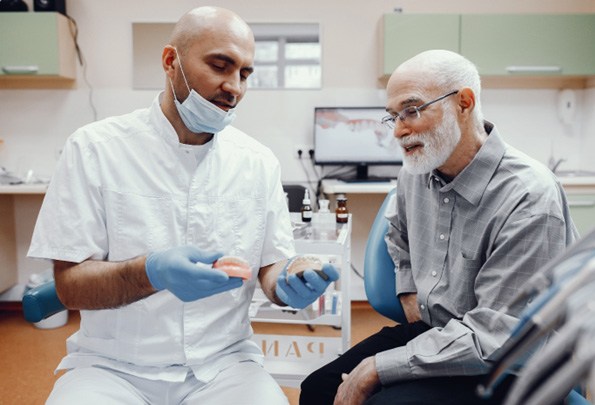
Whether you’re missing one tooth or many, almost anyone can get dentures. Being a good treatment candidate
doesn’t require that much. Still, you must consult
Dr. Kaopua
to confirm whether dentures would work for you. He can assess your smile and see if the restorations are a
suitable option. In case they aren’t, he could also make you a later candidate by healing your gum tissue
and bone structure. To learn more about denture candidacy, keep reading or
call our office
for details.
Learn More
Effects of Missing Teeth

When considering denture treatment, it’s helpful to review tooth loss’s causes and effects.
This step reinforces how prosthetic teeth could help your smile.
In truth, people of all ages lose teeth for various reasons. A tooth, for example, might decay to the
point it falls out or needs replacement. On the other hand, gum disease can erode the bone and tissue
that secure your chompers. Even dental injuries from accidents sometimes lead to knocked-out teeth.
Regardless of the cause, however, tooth loss effects are pretty consistent. Those with missing teeth
almost always struggle to speak, eat, or even smile. Plus, leaving smile gaps untreated will cause your
jaw to degrade. That latter process could trigger a facial collapse and yet further tooth loss.
What Qualifies You for Dentures?

As stated above, most patients qualify for dentures simply by lacking teeth. That said, other factors
worth considering exist.
Take oral health, for instance. Dentures could replace not only your missing teeth but also your
decaying ones. Furthermore, you need healthy gum and jaw tissues to be a good treatment candidate. Your
mouth wouldn’t be strong enough to support dentures otherwise.
The number of lost teeth is also relevant. Based on how many are missing, you’ll need one of two
possible denture types. The first, a partial model, is best for replacing a few teeth. A full denture,
meanwhile, is preferable when all pearly whites along an arch are gone.
Finances are also crucial to your considerations. Dentures, you see, are cheaper than other
restorations. As such, you might be a good candidate if you’re on a budget.
Alternative Tooth-Replacement Options
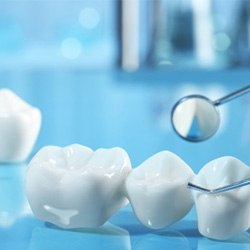
Should you not be a good denture candidate, that’s okay; we have additional options. More
specifically, Albright Family Dental has two other procedures you could try. These include:
-
Dental Bridges
– A dental bridge is a fixed restoration made of crowns fused to a pontic. It relies on
surrounding teeth for support, so it’s best for patients who’re only missing one or a
few chompers.
-
Dental Implants
– Unlike dentures or bridges, dental implants are prosthetic teeth placed in your jawbone.
Their titanium material lets them fuse with your jaw over time. Given this fusion, the new teeth are
secure, permanent, and pricey compared to alternatives.
Learn More About Dental Bridges
Learn More About Dental Implants
Types of Dentures

A denture is made of prosthetic teeth attached to a plastic gum-colored
base. Different kinds of dentures are available depending on individual
patient needs and preferences.
-
Partial Dentures: If you have multiple missing teeth,
partial dentures can fill in the gaps without needing to remove the rest
of the arch. Metal clasps are used to attach the dentures to your natural
teeth for added stability.
-
Full Dentures: Traditional full dentures remain as useful
as ever for replacing entire rows of teeth. Modern techniques have made
full dentures even more comfortable, and they can be designed to fit
securely on your unique gumline.
-
Implant Dentures: We can anchor dentures to dental
implants so that you can continue to enjoy the benefits of teeth supported
by roots that have integrated with the jawbone.
How Dentures Are Made
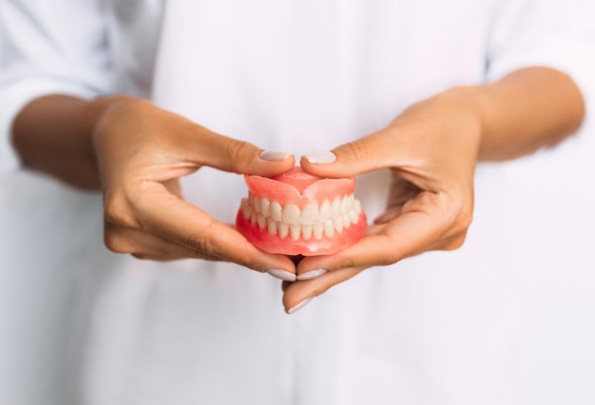
Do you know how dentures are made in Everett? If you’re like most people, you are unfamiliar with the
process
that is required to make your new teeth. Custom prosthetics that are personalized for you require the skill of a
trusted professional to ensure each piece fits together perfectly so that you can enjoy a comfortable and
natural-looking set of teeth. As you prepare to look at your new smile each day and enjoy the many benefits it
provides, learn how it is created so that you can appreciate it even more.
Learn More
What Are Dentures Made Of?
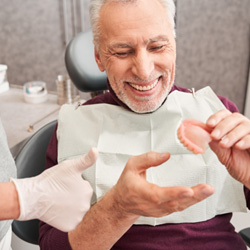
There are two parts that make up a full or partial denture: the base and the artificial teeth. The base
serves as the
foundation, while the artificial teeth provide improved bite force and appealing aesthetics. If you want
to learn
more about how each of these pieces are crafted, keep reading:
- Denture Base: The base serves to support your artificial teeth, which are affixed
in place. The
most common materials used to create the base of a denture are acrylic, resin, metal, porcelain, or
nylon;
however, acrylic remains the most popular option because of its ability to match your natural gum
tissue. When
crafting a partial denture, a metal framework and clips are incorporated so that it can attach to
regular teeth
when put into place.
- Artificial Teeth: Lab technicians will often use resin or porcelain when creating
artificial
teeth, but the latter remains most popular because of how it mimics the look of natural tooth
enamel. It’s
also highly durable. If a partial denture is required, a technician may not use porcelain, as it can
be more
abrasive and potentially damaging to neighboring healthy teeth.
The Denture Creation Process
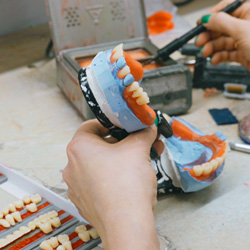
Creating a new set of dentures requires multiple steps; each one must be completed correctly if new teeth
are to
appear natural and comfortable when finished. The process follows these steps:
- Dr. Kaopua will begin by taking impressions of your mouth and measurements of your jawbone. This will be
used to
create a mold of your gums and bite so that lab technicians can generate a plaster model.
- Once the mold is sent to a local laboratory, technicians will begin to create a wax replica of your
gumline
before attaching artificial teeth to the replica. They will use what is known as an articulator
before shaping
the wax so that it matches your gums.
- At this point, we will receive the wax replica in our office and have you come in for an
appointment. This will
include trying on the mold to make sure it is correct. If so, it will be sent back to the lab for
completion.
- Once they are back in the hands of the technicians, they will place your dentures in a flask and add
plaster, so
the shape is maintained. Then, they will boil your prosthetics to remove any wax before injecting
acrylic and a
liquid separated into previously drilled holes within the teeth. This allows the acrylic to bond
with the teeth,
while the wax is completely replaced.
- After removing the plaster with special tools, your dentures will finally be revealed and placed in
an
ultrasonic bath. This helps remove any residue before excess acrylic is trimmed away.
- A final polish is administered before the dentures are returned to our dental office. You will
return to undergo
a final fitting, and our team will make any adjustments at this time, should they be required.
Adjusting to Your New Dentures

It’s natural to experience some mild soreness after receiving your initial set of dentures, and you
should
expect to go through an adjustment phase, especially when it comes to speaking and eating. Fortunately,
the more you
practice certain sounds and words, you’ll notice your speech improve. Also, after learning how to
eat
comfortably while chewing softer foods, you can begin to become more confident consuming solid foods. If
you want to
quicken the adjustment phase, you can also perform facial stretches.
Before you know it, your dentures will feel completely normal, but if you notice persistent discomfort,
make sure to
call our office so that we can evaluate your prosthetics and make the necessary adjustments.
Benefits of Dentures

When someone is missing multiple teeth, it can be challenging to complete tasks they once found easy. This
includes chewing their food, speaking clearly, and smiling with confidence. Fortunately, dentures are a
life-changing tooth replacement option for patients who are missing multiple or all of their teeth. It can
improve the quality of life! If you’ve struggled with tooth loss, dentures can give your smile another
chance by providing the following benefits.
Learn More
Psychological Benefits

People who no longer have teeth can have difficulty accepting their tooth loss. This can lead to effects
on self-esteem and social life. Those who are insecure about tooth loss are also less likely to engage
in social activities. Ultimately, it can mean a higher risk of experiencing sadness and depression. By
restoring the appearance and function of one’s smile with dentures, patients can see an increase
in their confidence. Dentures reduce anxieties about appearance, speech articulation, chewing ability,
and more!
Clearer Enunciation

It’s more difficult to speak when you are missing teeth. To pronounce and perform words, your lips
and tongue need to be positioned properly. Without the ability to touch your tongue to your teeth, some
words are very difficult to say clearly. Because dentures act as missing teeth, they allow wearers to
enunciate more clearly when speaking. After just a short adjustment period and a little bit of practice,
speaking will come naturally.
Improves Nutrition

Many nutritious foods are tough in texture. This includes vegetables, fruits, and healthy proteins. When
you can’t chew your food thoroughly thanks to tooth loss, you can experience issues like
indigestion or malnutrition. With an improved ability to chew, dentures allow for a more expensive diet
filled with nutritious foods. This way, your body can receive the essential nutrients it needs for
optimal overall health.
Preserves Oral Health

If you still have some natural teeth, getting dentures can keep them from shifting around to other areas
of the mouth and causing issues. Dentures also bear some of the weight of regular chewing, reducing the
wear and tear of your existing teeth.
Expands Opportunity

Your smile is one of the first things people notice when they meet you. When it comes to job interviews,
sales, and getting promotions, it is crucial to make an excellent first impression. Having a complete
smile is certainly an advantage!
Understanding the Cost of Dentures

You want to rebuild your smile with the help of dentures. Their popularity and ability to restore a
person’s ability to eat, speak, and smile with confidence are evident. You’re ready to take the next
step, but do you know how much they will cost? Determining how much you can expect to pay for your new set of
teeth requires a scheduled consultation with our team. But before you arrive, feel free to review the
information below, as it discusses more of what you can expect when it comes to the cost of dentures in Everett.
Learn More
Factors That Affect the Cost of Dentures

Replacing your missing teeth is important, but appropriate steps must first be taken to ensure the
process is successful, and the price is right. Most patients become deterred by a particular treatment
option once they learn the cost, but the truth is that no two cases are alike, so the price point for
dentures is always different.
Our team will consider a few different factors before creating a cost estimate you can review. These
include not only how many teeth you need to have replaced and the type of denture you’ll need
(full or partial) but also if you require any pre-denture treatment (i.e., periodontal therapy, bone
grafting) and the type of materials used to craft the prosthetics.
You might consider cheaper options that help you to save a few dollars, but keep in mind, these materials
will not hold up as long as higher-quality ones that are used by our team. Instead, you’ll be left
to replace them more frequently, resulting in more money spent.
Are Implant Dentures More Expensive?

There is the option to choose implant dentures; however, you should know that they are more expensive.
But when you consider the cost comparison, you might actually save by choosing a more permanent
prosthetic like implant dentures. The reason is that they permanently fuse with the jawbone, so they can
remain in place for 30+ years or a lifetime. Also, they offer maximum stability and bite force, so you
can eat your favorite foods and never worry about slippage.
Does Dental Insurance Cover Dentures?

In most cases, there is a good chance that your dental insurance company will cover a portion of your
dentures (up to 50%). This depends on the company and its individual plans. A member of our team will be
happy to review your policy and go over your available coverage so that you can plan properly when it
comes to paying for your treatment.
Other Options for Making Dentures Affordable

If private dental insurance is something you are not enrolled in, there is still a way to achieve a
complete smile without breaking the bank. With flexible financing through CareCredit, you can spend less
upfront and instead, spread out the cost of your care over several months, paying it down as you go.
Dentures Aftercare

While dentures can transform and improve your smile entirely, you’ll need to take proper care of them so
that they last. After all, you’ll eventually need to replace them with new ones, but that doesn’t
mean you have to do so prematurely. Other than visiting your dentist every six months for routine checkups, here
are several other ways that you can care for your dentures so that you can make the most of your tooth
replacements.
Learn More
Removable Dentures

Remove After Eating
Once you’ve finished eating your food, take out your dentures and rinse them off. This will keep
food debris and bacteria from accumulating around them. You’ll also have a chance to clean your
gums to prevent any plaque from forming there as well. Don’t use hot water, as this can end up
warping your prosthetics and cause you to need to adjust or replace them.
Clean Your Prosthetics
As mentioned above, it’s best to remove your dentures to clean them thoroughly, as you’ll be
able to clean the underside that meets your gums. Brush with a soft-bristled toothbrush and use a small
quantity of hand soap or denture cleanser. Avoid using regular toothpaste as this can be too abrasive
for your prosthetics. Store your dentures in a container of water or cleansing solution if you
aren’t going to wear them again, that way they stay moist and don’t lose their shape. Rinse
them again before wearing them so that you don’t ingest any cleaning materials.
Keep Your Dentures Safe
While brushing your dentures, place a soft towel underneath them in case they accidentally slip and fall
from your grip. This can help minimize any damage to them. When not in use, place them in a cup of water
or denture cleanser. Be sure to keep them out of reach of pets and small children.
Remove Dentures When You Sleep
Remember to take your dentures before going to bed. Soaking them overnight will not only keep them
bacteria-free until you wear them again, but you’ll also allow your gums the rest they need.
Keeping your prosthetics in for too long can irritate your gum tissue, restrict circulation, and prevent
your gumline from getting the necessary nutrients. You can also raise your risk of pneumonia and
gum/tongue plaque, so make sure to take them out and soak them in water or a denture cleanser.
Notice Changes
Be on the lookout for any changes to your dentures or your mouth while you have them. This includes any
damage to your prosthetics as well as gum irritation, mouth sores, and indications of infection. Notify
our team right away so we can help alleviate your symptoms and address the root cause of the issue so
you can get back to enjoying your full smile again.
All-on-4 Dentures
Since All-on-4 dentures are anchored by dental implants, they’ll function much more like your
natural teeth, especially since they shouldn’t be able to shift out of place. This means
you’ll simply need to practice normal oral hygiene by brushing and rinsing with mouthwash every
day to keep them clean and your mouth healthy. You might also use a dental threader if this allows you
to clean in between the underside of the prosthetics and your gums.
Denture FAQs
How Long Will I Have to Wait to Get Dentures After Having My Teeth Pulled?
The normal wait time between having your teeth extracted and receiving dentures is between six to eight
weeks. The exact amount of time can vary quite a bit depending on a few factors, such as how many teeth
needed to be removed.
The reason for the delay is that it takes time for your gums to heal properly, and we want to make sure
your mouth has fully recovered before we give you your new teeth. There are cases where you might be
able to get a denture on the same day as your tooth extraction, but because the shape of your jawbone
will likely change during the healing process, you’ll need to switch your denture out for a new
one later.
Does Getting Dentures Hurt?
You may experience some soreness after having your teeth removed. Make sure you’re taking your
prescribed pain medication as directed to manage your discomfort. As for the actual dentures themselves,
they might irritate your gums at first, but this will fade as your mouth adjusts to your new teeth. The
adjustment process can take several months, but if the discomfort seems to be growing worse over time,
let us know immediately.
Can I Sleep with My Dentures?
The simple answer is yes, you can. However, it’s generally better to take your dentures out before
you go to bed. Your gum tissue and jawbone have been enduring the pressure of supporting your dentures
all day; taking your teeth out will give your oral structures a chance to recover. When you take out
your dentures, you can soak them in a glass of denture cleaning solution. This will prevent them from
drying out while also getting rid of any bacteria that might have accumulated on your restoration.
Will It Be Hard to Talk with Dentures?
It will take some time to get used to speaking with dentures. Your mouth was previously accustomed to
speaking with your natural teeth, so it will need time to relearn the proper movements to make with your
new teeth. During the first few weeks, you may notice a slight lisp in your speech, and you might muffle
your words on occasion. To help your mouth adjust to dentures faster, you can practice reading out loud
to yourself and repeating any words that are giving you trouble. You can also try stabilizing your
dentures with a small amount of adhesive; this can make your speech a bit clearer by ensuring that your
teeth stay in place while you’re talking.























